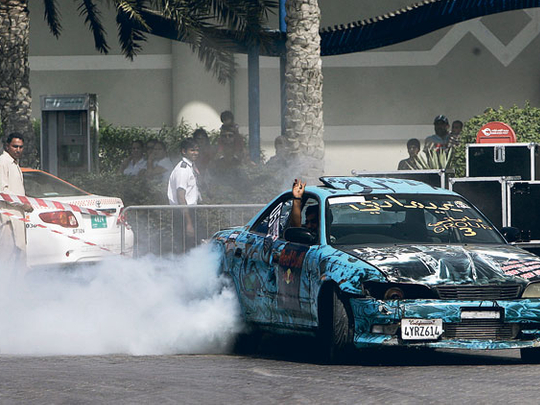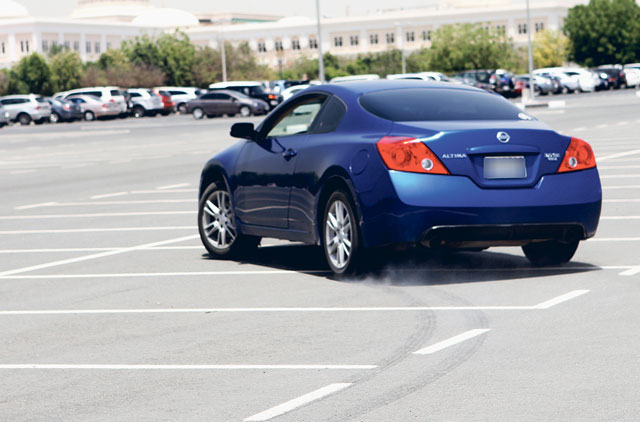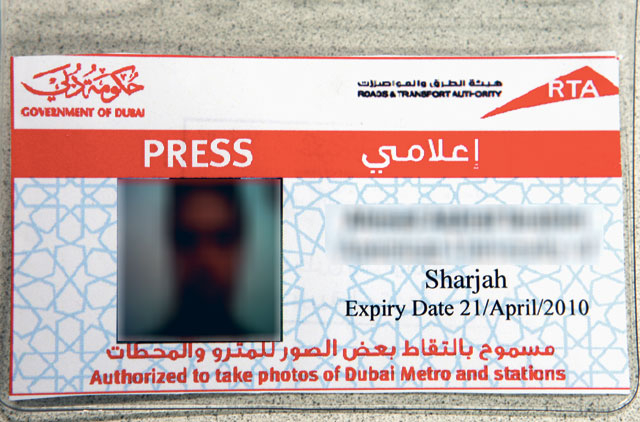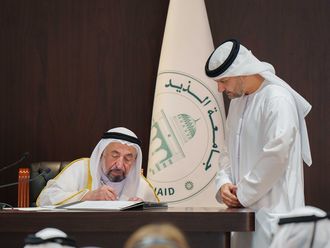
Despite extensive safe driving campaigns and alarming car accident fatality figures coming out of the UAE, there is still a section of the youth population thriving on the adrenaline rush of fast driving and dangerous manoeuvres.
Some have even gone as far as illegally faking Dubai Roads and Transport Authority (RTA) identification to close off roads, turning them into drag racing strips or drifting circuits.
Saif Salem, 24, has been racing for almost three years and it is the speed which authorities attempt to curb that he finds most thrilling. "When you can handle a car properly at such high speeds with all that adrenaline it's truly beautiful," said the student from a university in Sharjah.
In true underground style, Salem participates in illegal drag and drifting races at least three times a week in undisclosed locations in Dubai and other emirates.
He said road closed signs are used to seal off strips of road and parking lots where drag races between two cars take place.
Previously arrested and fined by Dubai police for being onsite at an illegal race, Salem said fake RTA press identification cards are made and carried by drivers to grant authorisation for filming.
"So if anyone asks we just say we are on set filming for a movie or project and have permission from the RTA to do so," he said. "It costs between Dh500 and Dh1,000 to enter a drag race between two cars, but drifting is where you can make the most money," he said.
With up to 22 participants in a drifting race, traffic cones are set up to mimic a circuit through which drivers need to skid and slide their cars one by one. The driver who finishes with the fastest time stands to win up to Dh20,000.
"All racers pay an entrance fee of around Dh2,000 and the winner takes all," said Salem. I have won drifts twice but it's is very hard to win a drift."
Having won over Dh40,000 in drift prize money, it is strictly put back into modifying his car to enhance its performance.
"It never gets boring. Every time I get money I want to do something new with my car and try it out on the streets," he said. "I don't take the money and spend it on clothes and outings, I spend it on my car."
With the authorities trying to stamp out the nation's need for speed, Peyman Younes Parham, RTA Director of marketing and corporate communications, reports the number of fatalities on Dubai roads caused by speeding has decreased significantly in recent years.
He said in 2009 there were 17 fatalities per 100,000 people compared to 24 fatalities per 100,000 in 2005. Referring to international road safety measuring methods he compared the UAE to countries such as Sweden and the UK which are deemed to have the safest roads in the world.
"To put it into perspective, comparing us to such countries who's numbers are between five and seven, it is evident our numbers are high," said Parham. However, he said the drop in fatalities on Dubai's roads is due to many reasons — mainly decreased tolerance for speeding. He said changes to road safety have been most evident in the past two years and are set to continue through rigorous campaigns in partnership with Dubai police and the private sector.
However, it remains evident that a section of the most targeted population for safe driving campaigns — males aged 18 to 25 — have managed to slip under the authorities' campaigning radar.
For other students it is not the money but simply the thrill of challenging another driver. "How it happens is strangers are stopped next to each other in their cars and one of them challenges the other to a race by sounding his horn three times…and on the third horn the race starts," said Sharif Hamed, 25, a Dubai based university student. "Sometimes I race in the Al Khawaneej area of Dubai at 3am when there is nobody on the streets," he added.
Street racing is no more than a muscle flexing exercise. "Basically we do it to show off our rides and our cars," said Salem. "It's feels really good when you beat the next guy," added Hamed.
Even injuries do not seem to deter these young men. Mohammad Ahmad, 17, a senior high school pupil in Al Ain, has broken his ankle from reckless driving in the desert but remains loyal to his hobby. "After breaking my leg I think I will continue," he said. "Sometimes I race on the streets and drift if I feel like it…these are just things we have to do in our adolescence to remember when we get older," added Ahmad.
Antics
However, the fact that Ahmad's brother died in a car accident almost five years ago makes him think twice about his speeding antics. "When I remember my brother I calm down," he said.
In places like University City in Sharjah measures such as increased speed bumps and installing speed cameras have been taken by the police to curb reckless driving. However, this does not seem to deter speed hungry drivers. Ahmad Yousuf, security coordinator for the American University of Sharjah (AUS), says the most violated traffic rule on campus is students exceeding the speed limit.
However, Saeed Al Shamsi, AUS Director of public relations and security, says reckless driving on campus is minimal, but students involved in accidents off the campus are common and sometimes result in death.
Unable to provide figures he said: "The number of students involved in accidents outside of University City and AUS is high, some have even died, but none of this happens inside University City."
"However we do have other problems related to driving in terms of rules and regulations."
Al Shamsi said many students coming to study at the university from outside the Gulf states drive on licences from their home countries, unaware that they must exchange them or qualify for a UAE driving licence. "Not changing their driving licence when they have a residency visa is against the law and this is an issue," added Al Shamsi.
- Student names have been changed to protect identities.
- With inputs from student writers Asma Shanavazi and Fatima Mulla from the American University of Sharjah














